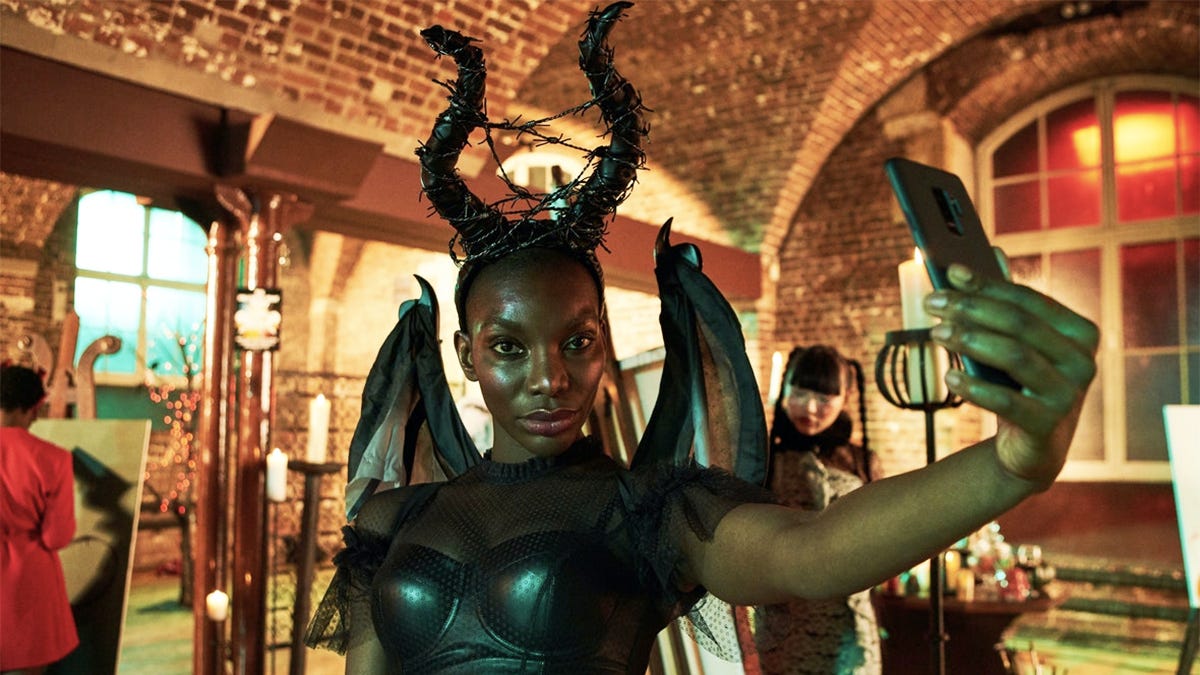the "promising young woman" who may destroy you
dread, trauma, and rape culture through a feminist gaze
**content warning: mentions of the aftermath of sexual assault/violence, plus big spoilers for the film “Promising Young Woman” and the TV series “I May Destroy You.”
if any of this is not for you, feel free to skip this one!**
I watched That Movie finally: “Promising Young Woman.”
Yeah, I know I am late to The Discourse around this one, but the story’s been echoing in my head since I saw it, and I can’t let it go completely.
“Promising Young Woman” follows Cassie, played by Carrie Mulligan, a thirty-something woman who works at a coffee shop by day and by night pretends to be blackout drunk at bars and clubs. When men try to take her home in order to take advantage of her, she confronts them, with terrifying and sometimes darkly funny results.
We learn that Cassie does this as a way to seek revenge for her best friend Nina, who, it is implied, killed herself after she was assaulted at a party during medical school and her assailant, Al, was acquitted of all charges. Cassie, who was also Nina and Al’s med school classmate, dropped out to care for Nina before her death despite everyone in Cassie’s life constantly reminding her that she would have made an amazing doctor.
Despite the desperate pleas of those around her begging her to move on, Cassie refuses. When she runs into an old med school classmate, she reluctantly begins to let her guard down and they begin dating. But when she learns that Al, seen as a “nice guy” and impressive doctor now with a perfect life and gorgeous new fiancé, Cassie is determined to seek revenge on her friend’s behalf. Posing as a stripper, she infiltrates his bachelor party, with tragic and bittersweet results.
The end of the film holds a pointed reminder: for a promising young man to be held to account, more than one promising young woman’s life has to end in order for anyone to look twice at the evidence corroborating his crimes.
*
I am a self-described Sensitive Person (but please oh please don’t call me an empath). What I mean by this is not merely that my feelings are easily hurt (although I am a Cancer so yes, my feelings are easily hurt), but that my radar for bad vibes and potential danger can be particularly strong, arguably more than it ought to be. Blame this on my anxiety and panic attacks, or blame this on being a woman, or rape culture, or anything, but the fact of the matter is I know I can be overly sensitive to the feelings of others. I fear the world around me, and I fear hurting those around me, and most of all, like Cassie, I fear watching those I love being hurt when I wish I feel I could have saved them.
Despite my noted love of horror films, I’m sensitive to films about sexual assault and violence because of how viscerally I feel that trauma and pain, even when characters and situations are fictional. I don’t avoid them, but I also know how to brace myself for their emotional impact.
Oftentimes my sensitivity is seen as a personality flaw, and I get that. More than one work supervisor, ex-partner, and friend have told me so. I have been the killjoy for many a book, TV show, movie, or song that I feel is insensitive to a marginalized group or to survivors of violence. I’m working on how I convey and control my sensitivity in productive ways. I’m a work in progress.
But the truth of the matter is: everything good in my life today is a result of my sensitivity: my writing; my teaching; my work ethic; my values; my friend group. I say this not to brag, but to ask: why is being a sensitive person, or friend, or coworker, and particularly a cultural viewer, have to be such a bad thing?
I say this not to conflate myself with Cassie or Nina or other characters like THEM: I say this because making films for an audience who have lived with sensitivity to violence, misogyny, and other forms of harm still feels like a relatively new frontier. A part of me feels spoken to when I watch these films, even when it’s hard to sit through. And so I watch, though I’d argue I’m not the audience member who could learn the most from the film.
The way I see it, “Promising Young Woman” is meant to affirm the Sensitive Viewer like me, but it is also an ode to the Sensitive Ones who have spoken up—particularly the ones who lost their lives after just for having made the choice to do so.
*
Is “Promising Young Woman” a perfect film? Hardly.
Our protagonist is named Cassie, an obvious nod to the tragic figure in Greek mythology who spurned her divine lover and as punishment would never be believed by anyone ever again. Because of her lover’s curse, the original Cassandra, much like our Cassie, was forced to watch her beloved city burned to the ground despite her repeated warnings.
Characters in the film are meant to stand in for institutions (Connie Britton as the passive and useless University Dean), cisgendered stereotypes (Max Greenwald as the Best Man/Wing Man), and internalized misogyny (Allison Brie as That Girl Who Is One of the Guys).
The soundtrack hits you over the head and the dialogue is peppered with every slut-shaming, date rape, and rape culture cliche so there’s no mistaking what the film is about. I also take issue with the unspoken issues of class and money present throughout the film; plus the idea that Cassie had to be depicted as a martyr, complete with incessant images of crosses, halos, and pietas, all in order to be seen as sympathetic.
Directly compare these images to the scrambled memory fragments, flashbacks, fantasies, and dramatic lighting that characterizes Michaela Coel’s stunning and haunting HBO series “I May Destroy You,” which also centers a date rape revenge fantasy storyline.
Unlike Mulligan’s Cassie, Coel’s character Arabella unravels when she is date-raped as she struggles to write a book due to her publisher. Arabella’s struggle to piece together what happened shows her working through stages of grief in the form of a descent into something hellacious, twisted, and impossible. She is a survivor and we see her friends fumble to support her with compassion and understanding as she tries to process her trauma. She even dresses as a literal devil in one episode as she live-streams her pain to thousands of followers.
Arabella’s desire to scream her struggles into the internet abyss is understandable, but it also doesn’t save or heal her. In “I May Destroy You,” trauma and revenge aren’t bright, cutesie, or archetypal. The show is especially powerful because it doesn’t involve any of the obvious cues. Everyone is complicated and difficult in this story: Arabella, a survivor, is not always likable; she disappoints her loved ones and the people who rely on her; her experiences are amplified and heightened because she is a woman of color even further marginalized than her white counterparts; Arabella’s friends love her deeply but grow frustrated or helpless as they try to support her; female characters often turn on one another within the story; men are survivors of sexual assault yet also perpetuate harm themselves. Every episode is peppered with heightened fear, sensitivity, denial, anger, despair, anxiety, and most of all, the desire to find answers and be seen.
Cassie, meanwhile, is angry. Her initial grief, denial, and initial fears in the wake of Nina’s death have long since boiled down into concentrated rage when we first meet her pretending to be drunk in a bar. No longer anxious, she is emboldened by her hardened and righteous fury born of injustice and grief.
In other words: if Cassie is saintly, Arabella is not. But then again, Cassie survived her friend’s death—she did not witness or endure the assault herself. Cassie is also several years out from her friend’s death. Arabella’s story is one of immediate trauma and survival, and it is stickier: after all, she’s a far more realistic depiction of what a survivor’s journey might look like in the direct aftermath of trauma, making it all the more difficult yet compelling to watch.
But “Promising Young Woman” is not meant to be subtle: and honestly, revenge fantasies rarely are. “I May Destroy You” is about revenge, yes, but it’s also far more about the ways that trauma changes our relationship to the world (steeped in rape culture) around us. Trauma changes how our brains and nervous systems react. In other words, trauma changes not only what we fear, but how our fear manifests, in our real lives and in our fantasies.
Us Sensitive Ones are allowed the dark satisfaction of watching the guilty, the complicit, the passive, and the scarred held to account in “Promising Young Woman,” seeing men forced to feel (kind of) similar traumas and violations that Nina felt not only on the night of her assault but also in its aftermath. Nina and Cassie’s traumas and deaths are given a neater ending, far neater than anything in “I May Destroy You,” but no ending would ever be fully satisfactory. That’s because trauma can’t ever be fully undone: it can only be reckoned with. There’s never a true happy ending to these stories.
But given the years of movies I have watched in which I have felt uncomfortable and in the minority, awkwardly sitting through rape jokes and pity parties for Nice Guys who the Nice Girl doesn’t want, “Promising Young Woman” felt like an answer to dissonances I’ve felt but could never articulate.
Yes, the movie refutes the male gaze, but it also holds that sensitivity that I’ve never seen explained with such ease. I searched for it in women-led revenge films like Kill Bill and Hustlers but never found a way to describe it: that it is the Sensitive Ones who are often the people with the strength to call out complicity and self-preservation. The Sensitive Ones have to ask that the guilty and the passive to be held to account. And if sensitivity is not strength in these cases, then I don’t know what is.
All of this is to say that “Promising Young Woman” rewards the Sensitive Viewer, just not with subtlety. The Sensitive Viewer will notice the not-so-subtle “nice guy” typecasting for all of the male characters (Bo Burnham being the quintessential nicest and goofiest of guys in the film) to dismantle the idea that “not all men” are complicit; the sweet-faced casting of Allison Brie and Connie Britton as complicit women who turned their backs on Nina in her hour of need; Mulligan’s exceptional facial expressions revealing her careful choreography as she lures men by pretending to be blacked out over and over again; and don’t forget the Easter-candy-color-palette always flawlessly painted onto Cassie’s nails, clothes, and hair so that her body is more easily identifiable at the end of the movie.
*
Throughout the film, Cassie is reminded by everyone, even Nina’s mother, that it is time to move on from Nina’s death. No one asks how or why this loss still effects her.
No one asks because no one else wants to hold the burden of Nina’s death with Cassie anymore. It is too heavy to bear, and only Cassie allows herself to feel its weight years after the fact. Cassie’s sensitivity is her strength, but it is also what keeps her holding others at arm’s length.
In fact, Cassie is seen as the Sensitive One because she is the only one who still says Nina’s name out loud. But aside from justice served, what she wants more than anything is to hear Nina’s name echoed back to her. She can’t get Nina back, but she can try to keep her friend’s trauma from being erased.
Arabella asks for the same in “I May Destroy You:” she wants and needs to be reminded of what happened to her, to remember the name and face of her assailant, to makes sense of what happened, and how she might make something out of the nightmare she endured. Her story is far more tenuous, but this is on purpose: far more survivors of sexual violence are quietly suffering and navigating their trauma in this way. Their recovery isn’t easy or polished or perfect, but it is still just as valid.
It is no secret that the best and more nerve-wracking thriller and horror stories are based on real actions humans have taken against one another. Arguably the most famous author to utilize this is Margaret Atwood in The Handmaid’s Tale, another near-revenge-fantasy based in rape culture. Every misogynistic, terrifying ritual in the book was based on a real human ritual executed at some point in history. Atwood’s decision to base Gilead’s most terrifying rituals on actual events is a viscerally felt rhetorical choice, one that feels like a creeping anxiety—it feels real because it is and was real.
So it makes sense that the sensitive Coel viewer feels this as well. Coel has been vocal about how “I May Destroy You” was based off of her own experience as a survivor of date rape while writing her first hit show, “Chewing Gum.”
“There is nothing bad that we’ve seen in this movie that we haven’t already seen and laughed at in a comedy” says the screenwriter, director, and producer of “Promising Young Woman,” Emerald Fennell (that’s right, young Camilla herself), who calls her film’s influences such as “Superbad” and “Sixteen Candles” a part of “seduction culture:” what we might think of as a branch of rape culture that casts likable and cute men as “not that bad” so we find ourselves laughing off any discomfort.
The male audience member also gets reassured by seduction culture films: look, not all men are complicit. There are nice guys and happy endings! But Fennell and Coel are both firm in their convictions that every character in their storylines is complicit in the harm another person has endured. Even the viewer is complicit. Sensitive or not, sympathetic or not, the viewer is as complicit as the perpetrator, if not more so, for their own silence, apathy, and desire to look away from another person’s trauma.
Imagined horror is scary, but real horrors are what unsettle us to the core. Sensitive viewers like me have been experiencing this to some degree for years. But now, other people can actually see it too, just in a number of different forms on screen, with more portrayals realistic than others. Each portrayal serves a different purpose, but with the goal of reminding the audience of their complicity all the same.
As both Fennell and Atwood argue, there’s nothing here I haven’t seen before. I’ve heard men joke at the bar about the girl who is too drunk to consent. I’ve been told to be polite to the boy in class who makes inappropriate remarks or the man who leers at me when no one is looking. I’ve watched as artists and filmmakers and actors I admired applauded and made excuses for men like Woody Allen, who we all knew was and is a sexual predator. Revenge porn is now so prevalent and insidious there are specific lawyers and law practices devoted to fighting it. Even in 2021, we are reminded over and over and over again how sad it is that a promising young man’s life was ruined by his “mistakes” without ever pausing to think about how promising the survivor’s life truly was (and still is).
But Fennell’s movie reminds us that the true victim is rarely the perpetrator, and when justice isn’t served, more than one life is demolished in the aftermath.
*
At the end of “Promising Young Woman,” Cassie offers Al a private show in his bedroom and he tells her that despite the debauchery happening outside the bedroom door, he’s really a gentleman.
“You might be surprised to hear that gentlemen are the worst,” Cassie tells Al as she handcuffs him to a bed frame. Despite her wit, this is the beginning of the end, and what happens next delves even deeper into that dreaded nightmare. She knows and the viewer knows that there is no happy ending to this story, even if we desperately wish to see one.
The escalating fear in this scene is also one that I’ve felt as a thousand teeny tiny cuts over the years, but now a film has echoed it back to me. It is equal parts disturbing and unsettling and yet strangely affirming of the fears I’ve always held.
Here, I tell my boyfriend, who watched “Promising Young Woman” with me: this is what it is. It’s over-the-top but that’s the point. This is how it looks. This is how it happens.
In other words: more films and TV shows are starting to show anxiety and sensitivity around sexual violence through a feminine (and feminist) lens, and it is more than a little ironic that easily dismissed feminized characteristics like intuition, thoughtfulness, sensitivity, and intelligence can only be truly seen in certain lights: in this case, the rape revenge fantasy.
Al is surprised when Cassie says gentlemen are the worst, but the audience is not. Or, at least, I, a supposedly promising sensitive young woman, sure wasn’t. And for once, that sensitivity was rewarded, even if the film’s terrifying yet bittersweet end may never be as satisfying as I wish it could be.









